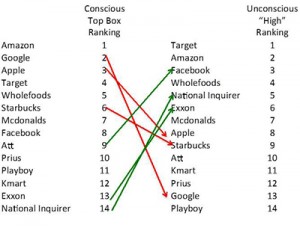Professor Joel Weinberger discovers how we really feel about some of the biggest brands.
by Bonnie Eissner
What do leopards have to do with Google or Apple or Amazon? Quite a lot, according to Joel Weinberger, Ph.D., a professor in Adelphi’s Derner Institute of Advanced Psychological Studies.
The connection involves our reaction to stimuli. Our brains evolved to process emotional, or gut reactions faster than logical thoughts. Dr. Weinberger gives the example of a prehistoric hunter-gatherer who encounters a leopard. “You see something moving around in the grass; by the time you go, ‘Seems to have a tail, looks like it has spots, it’s probably a leopard,’ it’s over for you,” Dr. Weinberger said. “What you need to do is get out.”
These unconscious processes govern much of our behavior, and, over decades of study, Dr. Weinberger has found ways to analyze, measure and even affect people’s unconscious thoughts.
Most recently, Dr. Weinberger teamed up with Young & Rubicam (Y&R), the advertising agency, to assess what people truly value and how that differs from what they claim to value. As part of the project, Dr. Weinberger tested 15 well-known brands, including Apple, Google, Facebook and Amazon, for their immediate emotional appeal.
 |
| Top brands and their true appeal, based on research by Joel Weinberger, Ph.D. |
What he found was that some of the brands, such as Apple and Google, rank higher in conscious appeal than they do in emotional appeal. Other brands, such as Facebook and National Enquirer, which ranked lower in the polling, did better in the emotional testing. A few brands, such as Amazon and Target, rate high at the conscious and unconscious levels, and some brands, such as Playboy, are lagging in both types of appeal.
Dr. Weinberger used subliminal techniques to test the brands’ emotional appeal. He flashed the brand logos too quickly for participants to consciously describe what they had seen, but slowly enough for participants to process the logos on an emotional level.
What do the different reactions predict? Dr. Weinberger explains that our conscious reactions dictate how we act when we are focused and presented with an immediate decision—whether to buy the latest, hyped iPhone version, for example. But our unconscious reactions determine how we will behave spontaneously and over the long term. He contrasts the short-term sales volume of the latest iPhone with Apple’s declining share of the smartphone market and its sinking stock price.
In a separate part of the Y&R study, Dr. Weinberger assessed people’s conscious and unconscious values in three countries—the United States, China and Brazil. Y&R has released the results in a PowerPoint presentation aptly titled “Secrets and Lies.” Dr. Weinberger found, for example, that, when asked, U.S. participants listed helpfulness as their top value. The testing found, though, that it ranks last (16 out of 16) unconsciously. The top unconscious value in the United States is security, right above sexual satisfaction.
Unconscious processes play a big role in politics too. During the 2003 California gubernatorial recall election between Gray Davis and Arnold Schwarzenegger, Dr. Weinberger and Drew Westen, Ph.D., a professor of psychology at Emory University, tested how Bill Clinton would swing the election, to determine whether he should campaign on behalf of Mr. Davis. Dr. Weinberger and Dr. Westen found that subliminal images of Bill Clinton had a significant impact on undecided voters and made a Democratic candidate—Gray Davis in this case—somewhat more appealing or, more precisely, less unappealing. Unfortunately for Mr. Davis, he decided against having Bill Clinton campaign for him—based on negative polling data—and he lost the election.
Dr. Weinberger has found other applications for his research on unconscious processes, including helping people overcome phobias, such as their fear of spiders.
He sees expanding opportunities for psychologists to apply their understanding of unconscious processes in business, particularly in marketing and advertising.
“Surveys don’t work, everyone knows that,” he said. “So [executives] need to follow the data and realize that something else works better. …In fact, people operate unconsciously more often and more powerfully than they operate consciously.”
For further information, please contact:
Todd Wilson
Strategic Communications Director
p – 516.237.8634
e – twilson@adelphi.edu